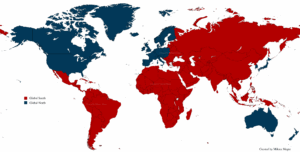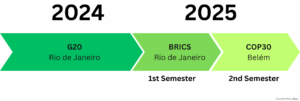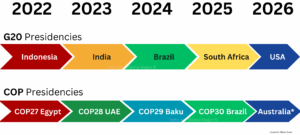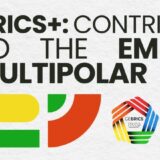By Milena Megre
On July 6 and 7, Rio de Janeiro hosted the BRICS Summit. On the first day, the debates addressed the themes “Peace and Security and Reform of Global Governance” and “Strengthening Multilateralism, Economic-Financial Affairs and Artificial Intelligence.” The second day was dedicated exclusively to the theme “Environment, COP30 and Global Health,” which took centre stage in the discussions. To analyse this second-day agenda, three documents stand out: the BRICS Leaders’ Declaration, the Framework Declaration on Climate Finance and President Lula’s speech in the third plenary session.
Joint recognition of the climate challenge
A first point to highlight is the fact that the BRICS group jointly recognised the climate challenge. This is already present in the opening of the Framework Declaration, which states:
“We emphasize that climate change is one of the greatest challenges of our time and that its impacts are already being felt in every region across the globe and acknowledge that the global nature of climate change calls for the widest possible cooperation.” (§4 Framework Declaration)
This recognition represents a major step, since we know that BRICS is not a bloc that usually carries out joint actions. The functioning of the group is based mainly on internal political coordination and converging positions. Moreover, it is known that BRICS members represent more than half of the world’s population, and among them are countries with large reserves of oil and gas. Therefore, the fact that they jointly recognise the impact of climate change and the need for an internationally coordinated response reveals relevant institutional maturity. By assuming that this is one of the greatest challenges of our time, the group sends a clear message of commitment.
Commitment and alignment before the UNFCCC and the 2030 Agenda
Another central point was the reaffirmation, both in the Leaders’ Declaration and in the Framework Declaration, of commitments to the United Nations Framework Convention on Climate Change (UNFCCC), to the Paris Agreement and to the 2030 Agenda, with specific emphasis on SDG 7 (Sustainable Development Goal 7) on “Affordable and Clean Energy.”
This positioning reinforces the idea that BRICS does not seek to antagonise multilateral institutions or replace them, but rather to act constructively within the existing international system. Still, the group brought important remarks:
In line with what was pointed out above, the group highlighted the importance of the G20 as the main forum for international economic cooperation. The Framework Declaration recognises the G20 as an essential platform for dialogue between developed and emerging economies, in an equal and mutually beneficial manner, to seek shared solutions and encourage a multipolar world. The continuity and effectiveness of the G20 are seen as essential, provided they are based on consensus and focused on concrete results.
The group continued to express support for structural reform in global governance, intending to make it more representative of the voices and needs of the Global South. This was one of the central topics of the Summit plenaries, discussed on the first day of the event. However, this theme was also adapted in light of the climate change discussions, through the reflections discussed below.
Lastly and equally important, now narrowing the debate within the Paris Agreement and the 2030 Agenda, BRICS defended in its declarations the principle of common but differentiated responsibilities, beyond the principles of equity and historical responsibilities.
This means that BRICS recognises that the responsibility for climate goals and the energy transition is shared by all, but the level of responsibility for the current impact of climate change is differentiated, since the countries that benefited from the Industrial Revolution and historical emissions are today considered developed countries. Thus, BRICS understands that, in light of the history of economic development and emissions intensity over the years by developed countries (understood here as countries comprising Western Europe and North America), those who benefited most from this process over time should not only adopt more ambitious targets but also support the countries considered developing or underdeveloped in reaching theirs, which have more moderate targets.
In a few words, it was defended that developed countries (also known as the “Global North”) must have more ambitious targets and help developing countries (or the “Global South”) through financing, while developing countries may have more moderate commitments and should receive financial support to achieve those targets.
Energy transition: balancing climate commitments with local contexts
In the field of energy transition, while under Brazil’s G20 presidency the government adopted the slogan of a “just and inclusive energy transition,” within the context of BRICS the group adopted the idea of a “just, orderly and equitable energy transition,” based on the principles of energy security, thus suggesting that to ensure a responsible and fair process for countries, there must be a gradual process that respects the energy structures and capacities of each country. This is expressed in the following excerpt from the Framework Declaration:
“[…] We acknowledge fossil fuels will still play an important role in the world’s energy mix, particularly for emerging markets and developing economies, and we recognize the need to promote just, orderly, equitable and inclusive energy transitions and reduce GHG emissions in line with our climate goals and observing SDG7, and the principles of technological neutrality and common but differentiated responsibilities and respective capabilities taking into account national circumstances, needs and priorities. Recognizing the interconnection between addressing climate change and promoting energy transitions, we reiterate our shared commitment to fostering economic development in a sustainable way in line with the UNFCCC, its Paris Agreement, and national circumstances.” (§90 Leaders’ Declaration)
The message is direct: many countries are still heavily dependent on fossil fuels, both for their energy and electricity matrices and for the functioning of their economies. BRICS defended that a truly just transition must respect this context. Despite criticism, particularly from sectors that expected a more direct condemnation of fossil fuel use, BRICS signals that it intends to build viable pathways for this transition to take place fairly, which were proposed throughout the declarations.
Still on the tangential themes of the energy transition, the document recognised the strategic importance of critical minerals as a vital component for developing low-carbon technologies. In light of this, the bloc emphasised that it is necessary to ensure more resilient supply chains. This process must ensure concrete benefits to producing countries, including through value addition and the preservation of their sovereignty over mineral resources and public policies, which is essential for countries such as Brazil, China, and Russia, among other bloc members.
The Declaration also mentioned work plans developed, such as the BRICS Energy Cooperation Roadmap 2025–2030 and the ongoing elaboration of Reports on Access to Energy Services and New and Sustainable Fuels. It also acknowledged the results carried out by groups such as the BRICS Senior Energy Officials Committee, the BRICS Energy Research Cooperation Platform and the 7th BRICS Youth Energy Summit.
Main theme: Climate Finance
The main instrument proposed to enable this transition is climate finance, which was the key agenda of the second day of the Summit for plenary discussions. It is worth highlighting that this is the first time the group has published a specific declaration on the topic, demonstrating its importance to the bloc’s member countries.
In view of the criticisms that could arise regarding paragraph 90 of the Leaders’ Declaration (mentioned above), two important positions are presented in other moments of the texts, seeking to provide pathways to enable a fair and gradual transition.
First, in addition to BRICS already defending that developed countries fulfil their obligation to provide climate finance, it pointed out that new and additional forms are necessary. Moreover, it was emphasised that this financing should be in the form of grants, unlike Official Development Assistance.
Second, the group argues that the financial support received by developing countries must be proportionally aligned with the ambition level of their climate actions. That is, the more ambitious a country is in its targets, the more financing it should receive. This logic seeks to promote a fair balance and encourage more ambitious commitments from BRICS countries. The Framework Declaration summarises this position:
“We underscore that the provision and mobilization of resources under the UNFCCC and its Paris Agreement is a responsibility of developed countries towards developing countries. We also emphasize that support received by developing countries should be in line with the ambition of their climate action. We urge developed countries to fulfill their obligations of providing finance to developing countries and to provide climate finance that is new and additional, grants-based, distinct from Official Development Assistance (ODA) and that does not come at the expense of assistance for other development needs, including poverty eradication. […]” (§7 Framework Declaration).
In this context, it is worth noting that the Framework Declaration mentioned the targets established in the last two COPs (Conferences of the Parties), both the COP28 in Dubai, of 100 billion dollars per year until the end of 2025 to meet development needs, and the climate finance target established last year in Baku at COP29, of 300 billion dollars per year until 2035 for developing countries. Also expressed in the same paragraph mentioned above:
“[…] We also call upon these countries to fully deliver on their commitments, under the UNFCCC and its Paris Agreement, in a timely and transparent manner, with clear plans, strategies and timelines, to achieve the finance goal of USD 300 billion per year by 2035 for developing countries, while also fulfilling their prior goal of mobilizing jointly USD 100 billion per year through 2025 to address the needs of developing countries.” (§7 Framework Declaration)
Considering these points, a crucial point of this BRICS Summit becomes evident: thinking about the climate issue, it is worth remembering that Brazil comes from a very intense international agenda, having held the G20 presidency last year, the BRICS and COP30 presidencies this year of 2025. The first semester was dedicated to BRIC, and the second semester will be dedicated to COP.
In this light, it is clear how this agenda had a clear strategy of building and concretely consolidating, with the involved countries and actors, greater alignment on climate issues towards COP30.
(Image created by the author)
This theory is further strengthened by the BRICS announcement during the Summit of two major initiatives to be launched at COP30 in November, presented below.
Initiatives Proposed by BRICS for COP30:
The proposal, entitled “Baku–Belém Roadmap”, aims to mobilise 1.3 trillion dollars in climate finance for developing countries. This was the climate target that was desired to be established last year at COP29 in Baku, but without success. Seeing this proposal emerge from the BRICS Summit shows how the grouping is strategically positioning itself to gain stronger and better alignment in the negotiations that will take place over two weeks in Belém. Last year, negotiations were quite difficult, as developing countries sought to bring forward the notion of historical responsibility by developed countries, demanding more ambitious climate finance targets, while developed countries negotiated to avoid such commitments and proposed a lower amount, which succeeded—going from 100 billion to 300 billion instead of the proposed 1.3 trillion. In addition, there was an attempt to place responsibility on other developing countries, such as China.
The launch of the Tropical Forests Forever Fund (TFFF). The proposal, mentioned both in the Leaders’ Declaration and in President Lula’s speech, aims to establish a blended finance instrument that guarantees predictable and long-term funding flows for forest protection. The initiative responds to the historical injustice of the carbon market and the undervaluation of tropical biodiversity.
Final Considerations
At the opening of the second day of the Summit, President Lula highlighted a key point that made the connection between the environment and health. The message conveyed was that the energy transition cannot be reduced solely to the energy agenda, as the replacement of fossil fuels with clean sources. For the Global South, this transition must be linked to climate justice and the overcoming of social inequalities. Talking about climate change in these contexts also means talking about health, education, food, basic sanitation and dignity. The climate crisis cannot be addressed in isolation. It must be tackled with a focus on improving people’s living conditions, especially the most vulnerable, who are already suffering directly from the effects of climate change.
Furthermore, drawing a brief parallel with one of the key themes of BRICS that was discussed at the Summit, which is the reform of the global financial architecture system, and placing this under the lens of the climate agenda, it was defended and widely understood, by consensus, that the current system does not meet climate urgencies and also does not allow countries of the Global South to carry out their energy transition and achieve their established climate goals, such as the Nationally Determined Contributions (NDCs). This is due to the lack of resources that would enable countries in the Global South to mobilise such actions, and in this way, it reaffirmed once again that providing these financial resources should be the responsibility of the Global North. The final message is that BRICS demands structural changes that make financing fairer and more accessible to make it possible for countries to achieve their climate targets.
Conclusion
As a diagnosis of the discussions of the second day of the BRICS Summit in Rio de Janeiro on “Environment, COP30 and Global Health,” it is possible to affirm that the Brazilian presidency of BRICS sought to continue a strategy initiated during the G20, of creating greater alignment among countries of the world so that we can arrive more aligned at the decision-making tables of international forums. On issues such as climate change, BRICS saw an opportunity to strengthen its discourse and positioning in the upcoming COP30 negotiations that will take place in Belém, through the meetings held among BRICS countries throughout this year.
Based on what was seen in the proceedings of the two days of the summit and on the conversations we had with diplomats and representatives of Itamaraty, it is possible to say that the summit’s proceedings were quite smooth and cohesive. The parties showed good internal alignment and agreed with the resolutions and proposals. This is a great success not only for the Brazilian BRICS presidency but also for the Global South, which thus consolidates its discourse in a more coherent and strengthened way to reproduce and echo it in other international forums.
(Image created by the author)
With the presidency of COP and the G20 shifting to the Global North from 2026 onwards, it becomes increasingly strategic that the South speaks with one voice. And at this moment, we see that this voice echoes with more conviction than ever.
References:
BRICS Leaders’ Declaration:
https://www.gov.br/mre/pt-br/canais_atendimento/imprensa/notas-a-imprensa/declaracao-de-lideres-do-brics-2014-rio-de-janeiro-06-de-julho-de-2025#english
BRICS Framework Declaration on Climate Finance:
https://www.gov.br/mre/pt-br/canais_atendimento/imprensa/notas-a-imprensa/declaracao-marco-dos-lideres-do-brics-sobre-financas-climaticas/leaders2019-framework-declaration-on-climate-finance.pdf
President Lula’s speech at BRICS Session 3: Environment, COP30 and Global Health:
https://www.gov.br/planalto/en/follow-the-government/speeches-statements/2025/07/president-lula2019s-speech-at-brics-session-3-environment-cop-30-and-global-health

















